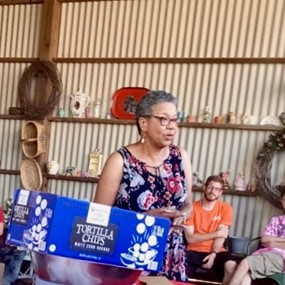Citizens, partnership support Wilcox County hospital
Wilcox County came close to losing its hospital that has served patients for decades. With the next closest hospital 40 minutes away, people in the community knew that saving J. Paul Jones Hospital, which opened in 1957, could be a matter of life or death.
Facing financial burdens, lack of reimbursements, and minimal resources, Wilcox County was days away from shutting down its hospital that served the Camden area for more than 60 years.
Unlike many hospitals in rural areas, this hospital, in one of the most impoverished regions in the nation, found a way to survive. With the support of the UAB Health System and citizens of Wilcox County, they were able to save the hospital, proving what working together can mean in rural Alabama.
The partnership was announced in February 2018 when the hospital entered a management agreement with UAB.
A series on Alabama Public Radio noted that five other rural hospitals have closed since the year 2010. Eighty percent of those that are left are operating in the red, in part due to Medicare, which pays less in rural Alabama than almost anywhere else in the nation.
Jessica McGraw, who has been on staff at J. Paul Jones since 2015 and will be taking over as CEO on July 1 this year, said, "A lot of things had to happen to save this place and keep the doors open. Our community really stepped up."
Implementing a one-cent county-wide sales tax played a vital role in keeping J. Paul Jones running. McGraw said, "That is really what is helping continue fund our operations today."
The UAB Health System managerial agreement helps with networking, streamlining revenue processes, getting new service lines, and providing other resources.
Partnering with UAB has given Wilcox County more access to healthcare with technology like telemedicine. "We are seeing a lot of telemedicine now. There is a lot of grant funding right now to initiate telehealth," McGraw said.
She added, "There is a Birmingham cardiologist who sees patients in our clinic with telemedicine. They now have electronic stethoscopes, so the physician in Birmingham can put on a certain headset, and the nurse here can hold that stethoscope to the patient, and the physician in Birmingham can hear, listening to heart rhythms and breathing."
Technology may be an avenue to new opportunities and resources for rural healthcare. Hospitals like J. Paul Jones hope to see more and are hopeful that healthcare will continue to improve in rural towns.
Today, the number one challenge at the hospital is staffing. McGraw said, “Right now, we are experiencing a nursing shortage. There are only so many nurses in this area within driving distance that want to come work for us."
She added, "Right now, with COVID, places are paying amounts an hour for an RN that we can't afford to pay. There is government funding through the Affordable Care Act and that does help supplement it. But when that runs out, what do you do?"
There are currently two shifts at the hospital, from 7 a.m. to 7 p.m. and from 7 p.m. to 7 a.m.- Typically, the hospital is staffed by an RN, LPN, and PCT during these shifts.
McGraw said, "It's just hard. We are a necessary and vital part of keeping a population in this county here. If there isn't a hospital, where would you go? And would people want to live somewhere without that?"
With the odds against them, Wilcox County came together for the common good. Continuing to fight hard to keep their doors open to serve, J. Paul Jones is on the uphill climb to build up resources and services to ensure safety and healthcare access for area residents.
McGraw said, "We are getting better. Right now, the hospital is very stable. There is no end in sight as far as closing goes."
Tags: Camden


